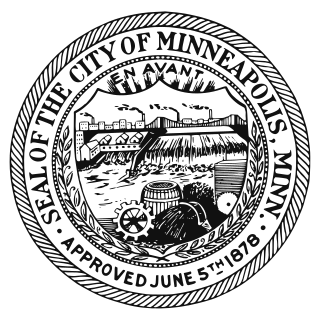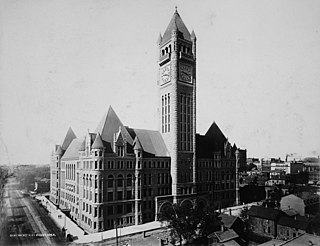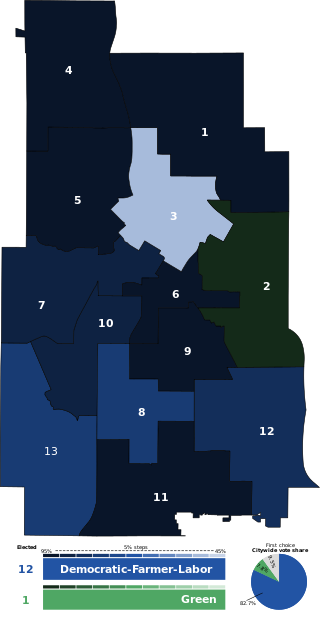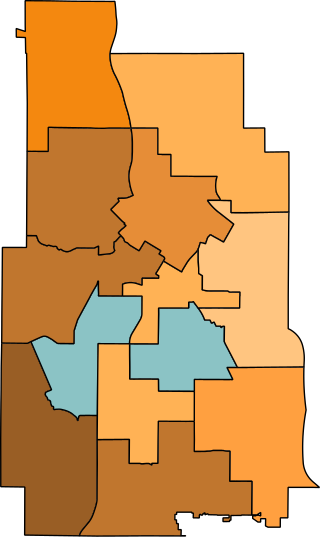| ||||||||||||||||
All 13 seats on the Minneapolis City Council 7 seats needed for a majority | ||||||||||||||||
|---|---|---|---|---|---|---|---|---|---|---|---|---|---|---|---|---|
| ||||||||||||||||
 | ||||||||||||||||
The 2001 Minneapolis City Council elections were held on November 6, 2001, to elect the 13 members of the Minneapolis City Council for four-year terms. [1]
| ||||||||||||||||
All 13 seats on the Minneapolis City Council 7 seats needed for a majority | ||||||||||||||||
|---|---|---|---|---|---|---|---|---|---|---|---|---|---|---|---|---|
| ||||||||||||||||
 | ||||||||||||||||
| Elections in Minnesota |
|---|
 |
The 2001 Minneapolis City Council elections were held on November 6, 2001, to elect the 13 members of the Minneapolis City Council for four-year terms. [1]
Members were elected from single-member districts. Municipal elections in Minnesota are officially nonpartisan, although candidates were able to identify with a political party on the ballot. [2]
| Party | Candidates | Votes | Seats | ||
|---|---|---|---|---|---|
| No. | % | ||||
| Democratic–Farmer–Labor Party (DFL) | 18 | 63,767 | 75.00 | 10 | |
| Green Party of Minnesota | 4 | 8,318 | 9.78 | 2 | |
| Independent | 3 | 11,178 | 13.15 | 1 | |
| Republican Party | 1 | 1,229 | 1.45 | 0 | |
| Write-in | 529 | 0.62 | 0 | ||
| Total | 85,021 | 100.00 | 13 | ||
| Source: Minneapolis Elections & Voter Services [3] | |||||
| Party | Candidate | Votes | % | |
|---|---|---|---|---|
| Democratic (DFL) | Paul Ostrow | 4,123 | 61.76 | |
| Democratic (DFL) | Dave Ramstad | 2,522 | 37.78 | |
| Write-in | 31 | 0.46 | ||
| Total votes | 6,676 | 100 | ||
| Party | Candidate | Votes | % | |
|---|---|---|---|---|
| Democratic (DFL) | Paul Zerby | 2,597 | 50.77 | |
| Green | Cam Gordon | 2,489 | 48.66 | |
| Write-in | 29 | 0.57 | ||
| Total votes | 5,115 | 100 | ||
| Party | Candidate | Votes | % | |
|---|---|---|---|---|
| Democratic (DFL) | Joe Biernat | 2,770 | 63.16 | |
| Green | Shane M. Price | 1,571 | 35.82 | |
| Write-in | 45 | 1.03 | ||
| Total votes | 4,386 | 100 | ||
| Party | Candidate | Votes | % | |
|---|---|---|---|---|
| Democratic (DFL) | Barb Johnson | 4,002 | 73.31 | |
| Democratic (DFL) | George Belmore | 1,417 | 25.96 | |
| Write-in | 40 | 0.73 | ||
| Total votes | 5,459 | 100 | ||
| Party | Candidate | Votes | % | |
|---|---|---|---|---|
| Green | Natalie Johnson Lee | 2,405 | 50.47 | |
| Democratic (DFL) | Jackie Cherryhomes | 2,333 | 48.96 | |
| Write-in | 27 | 0.57 | ||
| Total votes | 4,765 | 100 | ||
| Party | Candidate | Votes | % | |
|---|---|---|---|---|
| Green | Dean Zimmerman | 1,853 | 52.07 | |
| Democratic (DFL) | Dean Kallenbach | 1,672 | 46.07 | |
| Write-in | 34 | 0.96 | ||
| Total votes | 3,559 | 100 | ||
| Party | Candidate | Votes | % | |
|---|---|---|---|---|
| Democratic (DFL) | Lisa Goodman | 6,363 | 82.22 | |
| Independent | Sean Flynn | 1,345 | 17.38 | |
| Write-in | 31 | 0.40 | ||
| Total votes | 7,739 | 100 | ||
| Party | Candidate | Votes | % | |
|---|---|---|---|---|
| Democratic (DFL) | Robert Lilligren | 3,514 | 62.52 | |
| Democratic (DFL) | Vickie Ann Brock | 2,075 | 36.92 | |
| Write-in | 32 | 0.57 | ||
| Total votes | 6,676 | 100 | ||
| Party | Candidate | Votes | % | |
|---|---|---|---|---|
| Democratic (DFL) | Gary Schiff | 5,704 | 81.84 | |
| Republican | Lucy Rosenbloom | 1,229 | 17.63 | |
| Write-in | 37 | 0.53 | ||
| Total votes | 6,970 | 100 | ||
| Party | Candidate | Votes | % | |
|---|---|---|---|---|
| Democratic (DFL) | Dan Niziolek | 3,688 | 53.81 | |
| Democratic (DFL) | Doug Kress | 3,025 | 44.13 | |
| Write-in | 141 | 2.06 | ||
| Total votes | 6,854 | 100 | ||
| Party | Candidate | Votes | % | |
|---|---|---|---|---|
| Democratic (DFL) | Scott Benson | 5,278 | 58.49 | |
| Democratic (DFL) | John Bernard Casserly | 3,074 | 41.05 | |
| Write-in | 42 | 0.47 | ||
| Total votes | 8,394 | 100 | ||
| Party | Candidate | Votes | % | |
|---|---|---|---|---|
| Democratic (DFL) | Sandy Colvin Roy | 4,832 | 54.28 | |
| Independent | Wade Russell | 4,055 | 45.55 | |
| Write-in | 15 | 0.17 | ||
| Total votes | 8,902 | 100 | ||
| Party | Candidate | Votes | % | |
|---|---|---|---|---|
| Independent | Barret W.S. Lane | 5,778 | 54.89 | |
| Democratic (DFL) | Greg Abbott | 4,778 | 44.88 | |
| Write-in | 25 | 0.24 | ||
| Total votes | 10,581 | 100 | ||

Cranston, formerly known as Pawtuxet, is a city in Providence County, Rhode Island, United States. The official population of the city in the 2020 United States Census was 82,934, making it the second-largest city in the state. The center of population of Rhode Island is located in Cranston. Cranston is a part of the Providence metropolitan area.

The Minneapolis City Council is the legislative branch of the city of Minneapolis in Minnesota, United States. Comprising 13 members, the council holds the authority to create and modify laws, policies, and ordinances that govern the city. Each member represents one of the 13 wards in Minneapolis, elected for a four-year term. The current council structure has been in place since the 1950s.

The 2005 Minneapolis municipal elections in the U.S. state of Minnesota held a scheduled primary election on 13 September and a general election on 8 November. Voters in the city elected:

Minneapolis, the largest city in Minnesota, United States, and the county seat of Hennepin County, operates under a Mayor–council government system. This article provides an overview of the structure and functions of Minneapolis's city government.

The City-County Council of Indianapolis and Marion County is the legislative body of the combined government of the city of Indianapolis and the county of Marion in the state of Indiana. The council was established as part of the consolidation of city and county governments, enacted by Unigov on January 1, 1970.

The Detroit City Council is the legislative body of Detroit, Michigan, United States. The full-time council is required to meet every business day for at least 10 months of the year, with at least eight of these meetings occurring at a location besides city hall. The Detroit City Council has elected Mary Sheffield to be its president. The council may convene for special meetings at the call of the mayor or of at least four members of council.
A general election was held in Minneapolis on November 3, 2009. Minneapolis's mayor was up for election as well as all the seats on the City Council, the two elected seats on the Board of Estimate and Taxation, and all the seats on the Park and Recreation Board. This was the first election held in Minneapolis that used ranked choice voting, a collective term for instant-runoff voting and the single transferable vote.
The mayor of Austin is the official head of the city of Austin in the U.S. state of Texas. The office was established in 1840 after Austin incorporated as a city in 1839. The mayor of Austin is elected to a four-year term and limited to serving no more than two terms.

The 2013 Minneapolis City Council elections were held on November 5, 2013, to elect the 13 members of the Minneapolis City Council for four-year terms. 10 races produced a winner in the first round and the remaining three in the second round. Candidates affiliated with the Minnesota Democratic–Farmer–Labor Party (DFL) won all 12 of the seats where they had fielded a candidate, and the Green Party of Minnesota won the remaining one seat.
A general election was held in Minneapolis on November 5, 2013. Minneapolis's mayor was up for election as well as all the seats on the City Council, the two elected seats on the Board of Estimate and Taxation, and all the seats on the Park and Recreation Board. Voters were able to rank up to three candidates for each office in order of preference.

The 2009 Minneapolis City Council elections were held on November 3, 2009 to elect the 13 members of the Minneapolis City Council for four-year terms. Candidates affiliated with the Minnesota Democratic–Farmer–Labor Party (DFL) won 12 seats and the Green Party of Minnesota one seat.

Andrew Johnson is an American politician and systems engineer from Minneapolis, who represented the city's 12th Ward on the Minneapolis City Council from 2014 to 2023. Formerly President of the Longfellow Community Council, Johnson was first elected in 2013 as a member of the Minnesota Democratic–Farmer–Labor Party (DFL) and became the council's youngest sitting member at 29 years old. During his first term, he focused on ridding outdated, contradictory, and burdensome rules from the city's code of ordinances.

The 2005 Minneapolis City Council elections were held on November 8, 2005 to elect the 13 members of the Minneapolis City Council for four-year terms.
A general election was held in Minneapolis on November 7, 2017. Minneapolis's mayor was up for election as well as all the seats on the City Council, the two elected seats on the Board of Estimate and Taxation, and all the seats on the Park and Recreation Board. Voters were able to rank up to three candidates for each office in order of preference.

The 2017 Minneapolis City Council election was held on November 7, 2017, to elect the members of the Minneapolis City Council. The political composition remained unchanged, with the Minnesota Democratic–Farmer–Labor Party (DFL) retaining 12 seats and the Green Party of Minnesota one seat. Three DFL incumbents were defeated by intraparty opponents. The new City Council convened on January 8, 2018.

The Mayor of Gainesville is, for ceremonially purposes, receipt of service of legal processes and the purposes of military law, official head of the city of Gainesville, Florida and otherwise a member of, and chair of, the city commission, required to preside at all meetings thereof. The mayor is also allowed to vote on all matters that come before the city commission, but has no veto powers.

A mayoral election was held on November 2, 2021, to elect the mayor of the U.S. city of Minneapolis. Incumbent DFL mayor Jacob Frey won reelection to a second term, becoming the first Minneapolis mayor to win a second term since R. T. Rybak in 2005. Minneapolis mayoral elections use instant-runoff voting, also known as ranked-choice voting. All candidates appear on the same ballot and there is no primary election, nor is there a runoff. Minneapolis's twin city, Saint Paul, also held a mayoral election on the same day, using the same system.

The police abolition movement gained momentum in the U.S. city of Minneapolis during protests of the murder of George Floyd in 2020 and culminated in the failed Question 2 ballot measure in 2021 to replace the city's police department with a public safety department. The measure would have removed minimum staffing levels for sworn officers, renamed the Minneapolis Police Department as the Minneapolis Department of Public Safety, and shifted oversight of the new agency from the mayor's office to the city council. It required the support of 51 percent of voters in order to pass. In the Minneapolis municipal election held on November 2, 2021, the measure failed with 43.8 percent voting for it and 56.2 percent voting against it.

The 2021 Minneapolis City Council elections was held on November 2, 2021, to elect representatives for all 13 wards of the Minneapolis City Council. These elections occurred alongside the mayoral race and several other municipal offices, including Park Board and Board of Estimate and Taxation positions. The council elections were conducted using a ranked-choice voting system, which allows voters to rank candidates by preference on their ballots.
A general election was held in Minneapolis on November 2, 2021. Minneapolis's mayor was up for election as well as all the seats on the City Council, the two elected seats on the Board of Estimate and Taxation, and all the seats on the Park and Recreation Board. Voters were able to rank up to three candidates for each office in order of preference. Additionally, there were three ballot measures on the ballot related to government structure, public safety, and rent control.